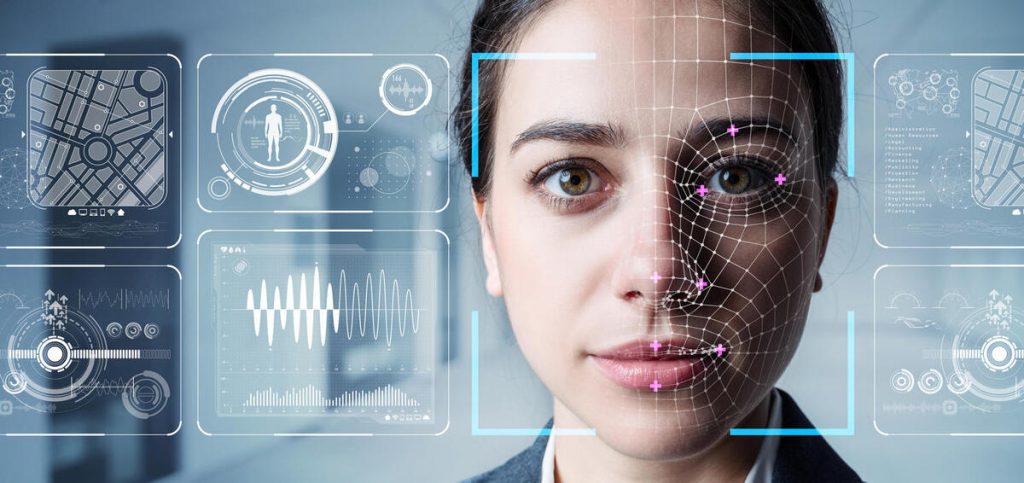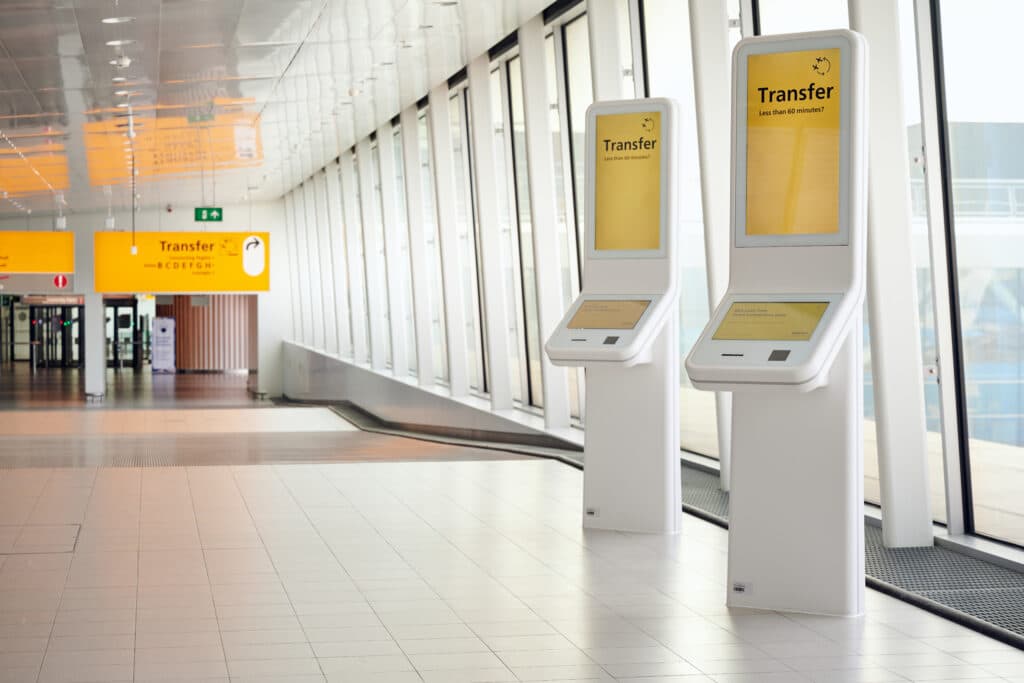The airport of the future
You recognize it: crowds, lines of waiting passengers in front of check-in counters and security checks, and the many signs that are supposed to show you the way through the maze called an airport. But how do you manage these huge flows of passengers? Especially at a time when consumers are increasingly demanding comfort and smooth individualized service. We take you on a short trip around the world in the latest developments toward the airport of the future.
Biometrics, artificial intelligence & robotics
The answer, of course, is technology. Machine learning is rapidly being integrated to improve processes for both consumers and operators. Consider baggage tracking and passenger flow monitoring at airports. This is increasingly using technologies such as augmented reality (AR), Internet of Things (IoT), artificial intelligence (AI), chatbots and biometrics.

Robotics
Take Frankfurt Airport's chatbot FRAnky. FRAnky helps passengers search for flights in German and English, sends flight status updates and provides information on nearby stores, restaurants and service facilities. Robots are also being used in the Netherlands, and that is in lifting luggage. The baggage robots take over the physically demanding part of baggage handling, the lifting of suitcases, from employees. In 2024, more of these robots will be purchased by to make the work in the baggage basement lighter for everyone and become an airport of the future!
Biometrics at the airport
And how about just showing your face instead of your passport and boarding pass from now on? Changi Airport in Singapore has vowed to go "passport-free" by 2024 and rely on biometrics instead. This will manifest itself in various automated touch points, from baggage drop-off to immigration to aircraft access. And it is not only in Singapore that they are pursuing this mode of travel. Biometrics are also already being used at check-in kiosks, pre-security and boarding gates at airports such as Hong Kong, Munich and Frankfurt. Forerunners in aviation innovation and all set to be the airport of the future! What's next!

Schiphol launches app for Apple Watch
Are you an Apple Watch user? Then it is convenient to download Schiphol's app! This app allows you to easily and quickly receive the most important information about your flight via your watch. Think of departure and arrival times, the departure hall and gate, to flight updates. Handy, isn't it?
In the terminal
At several airports of the future, robotics are already in full use to improve processes. Robots are already being used in Seoul and Guangzhou, signaling when people are not wearing mouth caps and others taking care of sterilizing frequently touched surfaces such as elevator buttons and baggage carts. At New York JFK airport, automated cameras already monitor crowds and alert when congestion occurs at certain points so that other routes can be opened.
Boarding
The final step in the process is contactless boarding. In the U. S. A., several "airports of the future" are already testing automated gates. Here your face is scanned and your identity biometrically verified.
Amsterdam Airport Schiphol
Short Connection Pass
Automation and sustainability are also in full swing close to home. For example, Amsterdam Airport Schiphol is now accelerating its use of facial recognition, which should make passport checks unnecessary. The Royal Netherlands Marechaussee is also looking at how contact moments can be reduced. In the future, passport controls will disappear entirely and you will enter Schiphol through a corridor in which everyone will be checked with technical aids. For transfer passengers, the 'Short Connection Pass' is currently being tested. People receive this pass by scanning their boarding pass when they transfer in less than an hour, allowing them to walk through the controls via an accelerated route.
Photo source: Schiphol

Preservation
Schiphol has taken the lead in making agreements in making aviation more sustainable. In the Netherlands, this has led to a common goal of the entire aviation sector. By 2030, the sector wants to have reduced CO2 emissions from aviation from the Netherlands to the level of 2005. By 2050, aviation will then be CO2 neutral. Schiphol is one of the European airports where biokerosene is available. One of the agreements is that by 2030, 14% of the fuel refuelled at Dutch airports will be sustainable. This is why Schiphol Group is also investing in Europe's first refinery for sustainable jet fuel. In addition, Royal Schiphol Group is participating in 2 startups that are taking the development and production of synthetic kerosene a big step further.
To and from Schiphol Airport
Schiphol has several sustainable ways to reach the airport:
- Electric public transportation: Since March 2018, more than 200 Connexxion electric public transport buses have been operating in and around Schiphol Airport and therefore do not emit CO₂, ultrafine dust and nitrogen.
- Electric cab fleet: Since March 2018, more than 200 Connexxion electric public transport buses have been operating in and around Schiphol Airport and therefore do not emit CO₂, ultrafine dust and nitrogen.
- Share car parking: Schiphol also has a special parking lot for shared cars. After all, car sharers are conscious drivers!
- Charging poles: Schiphol has a good number of charging stations, whose power comes from Dutch wind energy.
Flying electrically and on hydrogen
In addition, there are many developments in electric aircraft and hydrogen flying. Commercial flights in this manner are still a long way off, but there is much cooperation between the various airports in the Netherlands to move this forward.
As you can see, a lot is already evolving and certainly going to change at airports of in the future. All for your safety, comfort and personal experience. We keep a keen eye on developments and will of course keep you informed of news and developments to make your business trip now and in the future as relaxing as possible. On to the airport of the future!
Travel Well!
Eveline Repko
Manager of Operations Uniglobe Alliance Travel Goes
Update: This blog on airports of the future first appeared on Oct. 6, 2020, and was updated with new information on March 18, 2024.